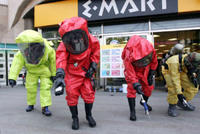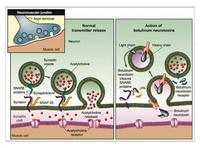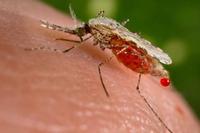-
Spokane, Wash. biolab could be closed due to budget cuts
Just two weeks ago, law enforcement agencies credited a bioterrorism laboratory in Spokane, Washington with quickly identifying the substance in several letters mailed to people in town as ricin. These same agencies now say that the biolab could close as a result of budget cuts.
-
-
Improving “crop per drop” boosts global food security, water sustainability
New study shows increasing crop water productivity could feed an additional 110 million people while meeting the domestic water demands of nearly 1.4 billion.
-
-
A majority on Earth will soon face severe, self-inflicted water shortage: scientists

A conference of 500 leading water scientists from around the world, held last week in Bonn, issued a stark warning that, without major reforms, “in the short span of one or two generations, the majority of the nine billion people on Earth will be living under the handicap of severe pressure on fresh water, an absolutely essential natural resource for which there is no substitute. This handicap will be self-inflicted and is, we believe, entirely avoidable.”
-
-
Smartphone turned into handheld biosensor

Scientists and physicians in the field could soon run on-the-spot tests for environmental toxins, medical diagnostics, food safety and more with their smartphones. Researchers have developed a cradle and app for the iPhone that uses the phone’s built-in camera and processing power as a biosensor to detect toxins, proteins, bacteria, viruses, and other molecules.
-
-
Oregon drills first responders for bioterrorism attack

A three day drill called the Portland Area Capabilities Exercise (PACE), simulating a terrorist attack involving a biological weapon, will take place across fifty different facilities and sixty-five jurisdictions in the state of Oregon.
-
-
Ricin can kill, but there are more potent bioterror weapons
Ricin was in the headlines a few weeks ago, when envelopes containing the poison were mailed to President Obama, Senator Roger Wicker (R-Mississippi), and a Mississippi judge. The threat from ricin is low, however, because ricin cannot poison someone through contact with the skin. To be poisoned, an individual would have to ingest or inhale traces of the poison.
-
-
New malaria test kit would help global elimination efforts

A new, highly sensitive blood test that quickly detects even the lowest levels of malaria parasites in the body could make a dramatic difference in efforts to tackle the disease in the United Kingdom and across the world, according to new research.
-
-
Bird flu in live poultry markets source of viruses causing human infections

Following analysis of H7N9 influenza viruses collected from live poultry markets in China, it was found that these viruses circulating among birds were responsible for human infections. These results provide a basis for the government to take actions for controlling this public health threat.
-
-
Studying botulinum genome to understand botulism harm

The toxin that causes botulism is the most potent that we know of. Eating an amount of toxin just 1,000th the weight of a grain of salt can be fatal, which is why so much effort has been put into keeping Clostridium botulinum, which produces the toxin, out of our food.
-
-
Potential flu pandemic looms
In the summer of 1968, a new strain of influenza appeared in Hong Kong. This strain, known as H3N2, spread around the globe and eventually killed an estimated one million people. A new study reveals that there are many strains of H3N2 circulating in birds and pigs that are genetically similar to the 1968 strain and have the potential to generate a pandemic if they leap to humans.
-
-
Pennsylvania emergency professionals receive WMD training
The Center for Domestic Preparedness (CDP) in Alabama hosted more than a hundred emergency professionals from the Pennsylvania South Central Mountains Regional Task Force’s Health and Medical Committee for in-depth response-to-WMD training.
-
-
Rendering mosquitoes immune to malaria parasites

Scientists have established an inheritable bacterial infection in malaria-transmitting Anopheles mosquitoes that renders them immune to malaria parasites. The strategy holds promise for malaria control efforts.
-
-
Illnesses in U.S. on the rise as a result of decline in foreign food inspections
More Americans get sick every year as a result of food-borne pathogens. The reason: inspections at foreign food factories shipping food and food ingredients to the United States have declined in recent years, and border inspections of food coming into the country could be next to be reduced. Experts say this decline in inspections is especially worrisome since Americans consume more imported food – or food made with imported ingredients – every year, and foreign food production and processing facilities often do not meet U.S. sanitation and hygiene standards.
-
-
Silica particles purify water by acting as oil magnets
Engineers develop an innovative method designed to purify water through the rapid removal of oily pollutants. The technology involves the deployment of surface engineered silica particles, which act as oil magnets in water, adsorbing oil, yet repelling water.
-
-
Ebola's secret weapon revealed: its ability to short-circuit the immune system
Researchers have discovered the mechanism behind one of the Ebola virus’ most dangerous attributes: its ability to disarm the adaptive immune system. Scientists determined that Ebola short-circuits the immune system using proteins that work together to shut down cellular signaling related to interferon. Disruption of this activity, the researchers found, allows Ebola to prevent the full development of dendritic cells that would otherwise trigger an immune response to the virus.
-
More headlines
The long view
Ransomware Attacks: Death Threats, Endangered Patients and Millions of Dollars in Damages
A ransomware attack on Change Healthcare, a company that processes 15 billion health care transactions annually and deals with 1 in 3 patient records in the United States, is continuing to cause massive disruptions nearly three weeks later. The incident, which started on February 21, has been called the “most significant cyberattack on the U.S. health care system” by the American Hospital Association. It is just the latest example of an increasing trend.
